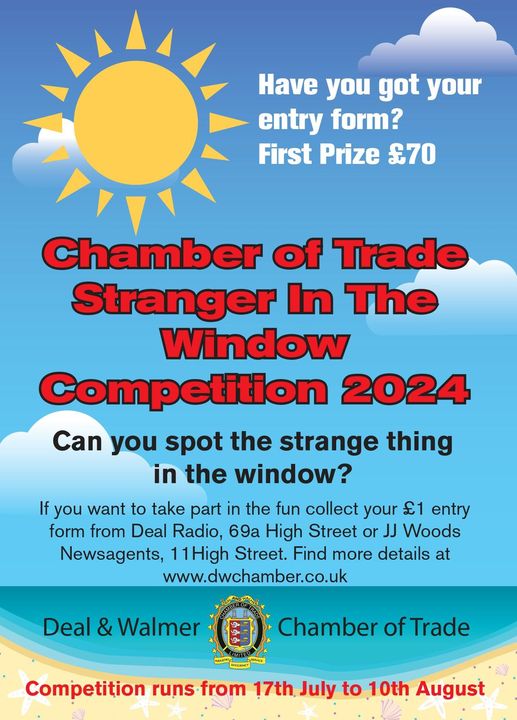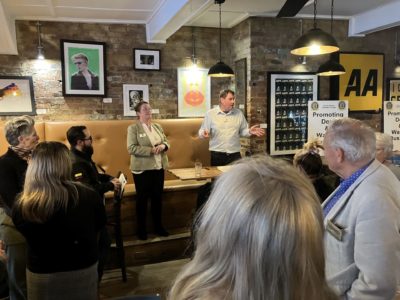History of Deal & Walmer Chamber
Deal Town
The inaugural meeting of the Deal and Walmer Chamber of Commerce was held at the Carter Institute in February 1905 with the mayor, Alderman F H J Hayward present. J E Edgar was appointed president and the committee then went carefully into the rules governing the chamber and other preliminary matters. Within two months 45 members had paid their subscriptions. The first annual dinner was held at the South Eastern Hotel in 1906 and at this time the Chamber was raising the issues of the train service to London and a steamboat service from the pier, matters which recur today although for different reasons, price and convenience then, speed and tourism now. Efforts to attract visitors were then directed to medical officers of health in various parts of the country, not something that would work today. By 1910 (the earliest Annual Report in the archives) the membership was 106.
The preamble, with its echoes of a more genteel and literary age reads
“It is in the highest degree satisfactory to be able to report that, at the end of the sixth year of it’s existence, the Chamber stands, both numerically and financially, in a stronger position than any previous period in it’s history. It’s membership in 1910 reached the high figure of 106, being an increase of 7 on the figure of 1909, despite many no doubt inevitable losses. This is a very considerable membership and compares favourably with that of many more populous towns.”
The annual subscription was 10/6 and the accounts show a balance of £70 15s 1d. Activities reported included attempts to get the rail journey time from London down to 2 hours (finally achieved in 2011), a successful attempt to get Dover replaced by Deal as the postal town for villages in the vicinity, printing and distributing 30,000 copies of an illustrated four page leaflet at a total cost of £20, 500 copies of a booklet with an art cardboard cover were produced and presented by the then secretary (Mr B Richmond of Minerva Printing Works, Oak Street), the cost of production being covered by advertisements, affiliation to the Trade Protection Society for debt collection (“for a nominal sum members can obtain status reports respecting individuals in any town”) and a report on the Plate Glass Insurance Scheme, a local mutual scheme. The Chamber had also hosted a conference of the East Kent Chambers of Trade with representatives from Ashford, Broadstairs, Canterbury, Dover, Folkestone, Margate and Ramsgate.
In 1915 the Chamber complained to the Home Secretary of the stringent interpretation placed by the Chief Constable of Kent on the order made by the government regarding the showing of lights. It was argued that it was not possible for German submarines to see the High Street and at least premises facing away from the sea should be able to have lights to continue to trade after dark. There was no argument about a similar restriction in the next war.
In 1911 members had been taken on a tour of Snowdown and Tilmanstone Collieries and in 1920 encouraged an application by Betteshanger Boring Co. to the Corporation, to acquire its mineral rights, to enable them to access the coal seams under the sea. When the pit was opened they found themselves necessarily considering the problems caused by the sudden influx of a large number of residents from other parts of the country and carefully watching any changes in trade. During these years the Chamber increased in strength and numbers and concentrated on advertising and promoting Deal.
From the Second World War issues of red tape came to the fore. After rationing, evacuations, early closing, blackout, and firewatching were no longer a problem the question of rebuilding and reconstruction was. Members were helped with trading licences and rating valuations and representations about the1947 Town and Country Planning Act were made to ensure that member’s interests were properly considered, as happens today with its later reincarnations. Deciding not to change the early closing day from Thursday to Saturday was relatively straightforward.
The Chamber had changed its name to Deal and Walmer Chamber of Trade in 1937 and was incorporated under that name as a company limited by guarantee on 13th September 1948 when the Memorandum and Articles of Association were signed. A trades exhibition was held and there was a large increase in the membership. The Chamber was very much in favour of replacing the pier and rejoiced in 1953 when a start date was announced.
In more recent years the Chamber took on the Town Centre Management role that in other towns is performed by a paid employee of a local authority body and set up the Shop Watch radio scheme which enables retailers to communicate directly with the CCTV operations centre and with each other to warn about shoplifters and other suspicious persons. This has now been taken over by Dover Partnership Against Crime and combined with Pub Watch for both Deal & Dover. To compete with the free parking offered by out of town shops a scheme was introduced to allow shoppers to get a refund of one hours parking charge when they spent £10 with a participating member. Since the 1970’s the Chamber has been expended putting up Christmas light decorations in the town for the Christmas shopping period and a switch on event which celebrates the generosity of the local volunteers, business and public that support this cheering display that is the envy of many towns.
On the social front, in addition to annual dinners and other events that have undoubtedly gone unrecorded, there was a stoolball match (https://en.wikipedia.org/wiki/Stoolball) between a team representing the Chamber and one representing the Corporation in 1939 and in 1960 the Chamber arranged for a team from Deal to take part in the Southern Television show “Beat Your Neighbour”. The Stanger in the Window competition in which shopkeepers hide something in their window which they don’t normally sell and children (mostly) escort their elders from shop to shop during Regatta and Carnival period, inevitably also seeing what they do sell and is therefore effective advertising, has become perennially popular since the 1980’s. For the Queen’s jubilees and the King’s coronation the Chamber ensured the town centre was festooned with bunting, giving the High Street a festive feel.
The Chamber continues to strive to enrich the towns environment to invigorate the business landscape for the betterment of the visitors, residents and more importantly the businesses in the area.
If you have any questions or have memories of the Chamber please contact the Chambers Secretary at enquiries@dwchamber.co.uk
Some issues are no longer important while new ones arise; others just evolve and continue. The work of the Chamber goes on.
Past Presidents and Chairmen
To record the contributions they made to this Chamber and the town, the following served as President or Chairman. Some names will be recognised from roads named in their honour or the businesses they founded that continue today.
Presidents / Chairman
1905 J E Edgar
1906 T Steed Bayley
1907 E T Hinds
1908 C Russell
1909 W Darracott
1910 W P Matthews
1911 T Steed Bayley
1912 S Pittock
1913 F W Hardman
1914 C J Burgess
1915 L B Watson
1916 R Pembrook
1917 J Tapping snr
1918 A W Lambert
1919 A W Lambert
1920 E J Dobson
1921 W H Redsell
1922 W G Hemmings
1923 W G Hemmings
1924 Lt Col R Standen
1925 E T Chittenden
1926 G W Hardman
1927 G W Hardman
1928 Dr G T Birdwood
1929 G H Fowler
1930 Maj C J Murfitt
1931 Maj C J Murfitt
1932 H H F Sirr
1933
1934 A J Lambert
1935 D A Daniels
1936 L Hay
1937 W Kyle
1938 S Little
1939 R J Barnes
1940 J Tapping
1941 J Tapping
1942 J Tapping
1943 C C Prime
1944 C B Crump
1944 C B Crump
1945 A E M Cavell
1946 F S Townsend
1947 V K Phillips
1948 C W Langdon
1950 R J Barnes
1951 E W Benning
1952 C J Langdon
1953 C Lock JP
1954 C W L Prime
1955 C A Joyce
1956 W E Rice CBE JP
1957 H W Harding
1958 F W B Corcran
1959 D Tapsfield
1961
1962 P M Hill
1963 E F Owen
1964 J Parkin
1965 J F Elcock / B B Perez
1966 B B Perez
1967 V K Philips
1968 C Corbishley
1969 J Alistair Lawton
1970 J Alistair Lawton
1971 F A McCloughlin
1972 A E M Cavell
1973 R C Howland
1974 J T Ludwig
1975 G G le Touze
1976 C Lock
1977 Roy H J Knowles
1978 Roy H J Knowles
1979 Roy H J Knowles
1980 A J G Barker
1981 D J Cheap
1982 P J Pontin
1983 Pat G Heath
1984 W T Bridgend
1985 D J Cheap
1986 Mrs Sheila K Whisker
1987 P H James
1988 Ian Dunkerley
1989 Pat G Heath
1990 Pat G Heath
1991 A G Marsh
1992 Mrs Pat Wools
1993 Gordon Henson
1994 Mrs C Watkins / Simon N Roscoe
1995 Simon N Roscoe / Nick J Ferrer
1996 Nick J Ferrer / Barry Vile
1997 Barry Vile / Simon N Roscoe
1998 Pat G Heath
1999 Pat G Heath
2000 Pat G Heath / Alan Spiers
2001 Pat G Heath / Alan Spiers
2002 Pat G Heath / Alan Spiers
2003 Pat G Heath / Alan Spiers
2004 Pat G Heath / Alan Spiers
2005 Pat G Heath / Alan Spiers
2006 Pat G Heath / Peter Varrall
2007 Pat G Heath / Peter Varrall
2008 Pat G Heath / Peter Varrall
2009 Bob Humphreys / Peter Varrall
2010 Bob Humphreys / Peter Varrall
2011 Bob Humphreys / Peter Varrall
2012 Peter Varrall / Peter Jull
2013 Peter Varrall / Peter Jull
2014 Peter Varrall / Peter Jull
2015 Peter Varrall / Peter Jull
2016 Peter Varrall / Peter Jull
2017 Peter Varrall / Peter Jull





